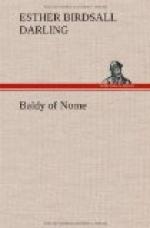The great world “Outside,” and its troubles, seemed far away.
International difficulties, the Fall of a Monarchy? Interesting of course, but on the last Holiday, Charles Johnson, with his marvelous Siberians, supplemented the previous Siberian triumph of John Johnson by winning the Solomon Derby of that year; making the course of sixty-five miles in but little more than five hours. That was something to worry one.
Suffrage? Desirable for many places, naturally. Though in Nome a woman could be a member of the Kennel Club, enter a racing team, and vote on school matters, long before the franchise was given her by the Legislature in Juneau. And surely that, all agreed, had been as liberal a policy as any reasonable female should have demanded from any community.
The Tariff, Panama Canal news, and graft prosecutions? Well, of course, one discussed such affairs casually; but after all, the Dog Question in all its phases was of far more immediate importance to Alaskans. And so they spent many an hour in reminiscences and prophecies; and were thrilled over and over again with the excitement of the great contests they had witnessed—lost and won; basing predictions for the future on the achievements of the past.
Then the dogs would be roused by the entrance of the Eskimo hunters, who stopped in the dusk of the evening on the way back to their settlement at Mary’s Igloo, to barter for their day’s bag. And later they sniffed with keen pleasure the wonderful smells from the adjoining kitchen; smells of broiled trout, reindeer steaks, and Arctic grouse—and fainter, but more delicious still, the odor of their own meal being cooked in the tent beside the cabin door.
They remained at the Springs a couple of weeks; and delightful weeks they were, too, but for one unfortunate incident, which was precipitated because of Tom’s aristocratic race prejudice.
He had always hated Eskimo dogs; choosing either to ignore his own huskie blood, or feeling that it was superior to the native strain in the malamutes of the coast—just as some people boast of being descended from Pocahontas, but would shudder at the mere idea of a Siwash Squaw ancestress.
At all events, Tom had resented the entrance of the Eskimo, Wolf, into the Kennel; and never failed, when “Scotty” was not about, to manifest an enmity that would have told a civilized dog not to attempt any liberties with him. But Wolf was only an ignorant puppy, taken from a native igloo, where all of the dogs and all of the family lived in happy harmony; and so, one day when he was particularly joyous, he nipped, in a spirit of mischief, the end of Tom’s wagging stump of a tail. Tom wheeled instantly, his hair bristling and his jaws apart, but the timely arrival of Matt made further demonstration impossible; and Tom’s instinctive dislike for Wolf grew into an obsession after that direct and personal insult.
In their well-appointed quarters in Nome, with each dog in his own stall, revenge was out of the question; and when in harness, or out with Matt for exercise, there was as little chance for settling a grievance as there would be with soldiers on parade. But at the Springs Tom’s opportunity came.




